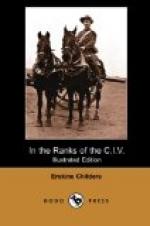from which we snatched furtive moments with our friends
on the crowded quay. For hours a stream of horses
and mules poured up the gangways; for two other corps
were to share the ship with us, the Oxfordshire Yeomanry
and the Irish Hospital. At two the last farewells
had been said, and we narrowed our thoughts once more
to all the minutiae of routine. As it turned
out, we missed that tide, and did not start till two
in the next morning; but I was oblivious of such a
detail, having been made one of the two “stablemen”
of my sub-division, a post which was to last for a
week, and kept me in constant attendance on the horses
down below; so that I might just as well have been
in a very stuffy stable on shore, for all I saw of
the run down Channel. My duty was to draw forage
from the forward hold (a gloomy, giddy operation),
be responsible with my mate for the watering of all
the horses in my sub-division—thirty in
number, for preparing their feeds and “haying
up” three times a day, and for keeping our section
of the stable-deck swept and clean. We started
with very fine weather, and soon fell into our new
life, with, for me at least, a strange absence of
any sense of transition. The sea-life joined
naturally on to the barrack-life. Both are a constant
round of engrossing duties, in which one has no time
to feel new departures. The transition had come
earlier, with the first day in barracks, and, indeed,
was as great and sudden a change, mentally and physically,
as one could possibly conceive. On the material
side it was sharp enough; but the mental change was
stranger still. There was no perspective left;
no planning of the future, no questioning of the present;
none of that free play of mind and will with which
we order our lives at home; instead, utter abandonment
to superior wills, one’s only concern the present
point of time and the moment’s duty, whatever
it might be.
This is how we spent the day.
The trumpet blew reveille at six, and called us to
early “stables,” when the horses were
fed and watered, and forage drawn. Breakfast was
at seven: the food rough, but generally good.
We were split up into messes of about fourteen, each
of which elected two “mess orderlies,”
who drew the rations, washed up, swept the troop-deck,
and were excused all other duties. I, and my
friend Gunner Basil Williams, a colleague in my office
at home, were together in the same mess. Coffee,
bread and butter, and something of a dubious, hashy
nature, were generally the fare at breakfast.
I, as stableman, was constantly with the horses, but
for the rest the next event was morning stables, about
nine o’clock, which was a long and tedious business.
The horses would be taken out of their stalls, and
half of us would lead them round the stable-deck for
exercise, while the rest took out the partitions and
cleaned the stalls. Then ensued exciting scenes
in getting them back again, an operation that most
would not agree to without violent compulsion—and




